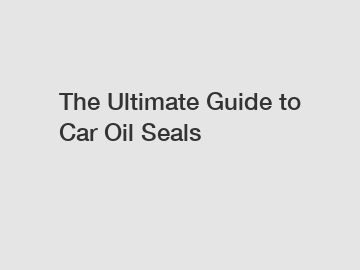The Ultimate Guide to Car Oil Seals
As a car owner, you know how important it is to properly maintain your vehicle. Oil seals play a crucial role in preventing oil leakage and maintaining the overall performance of your car's engine. In this comprehensive guide, we will explore everything you need to know about car oil seals, from their functionality to signs of wear and tear, and how to replace them when needed. So, let's dive in!
Chapter 1: Understanding Car Oil Seals.
Oil seals, also known as shaft seals or grease seals, are vital components that prevent lubricating oil from leaking out from crucial engine parts while also keeping contaminants at bay. They are typically made of rubber or metal, featuring a sealing lip that creates a barrier between the rotating shaft and its housing.

Chapter 2: The Functionality of Car Oil Seals.
Oil seals fulfill two primary functions: preventing oil leaks and keeping out harmful contaminants. By sealing the gap between the rotating shaft and stationary housing, they ensure that oil stays in the intended compartments, lubricating the components effectively. Additionally, oil seals restrict dirt, water, and other contaminants from entering the system, safeguarding the engine's longevity and performance.
Chapter 3: Signs of Worn-out Oil Seals.
Over time, oil seals may deteriorate due to excessive heat, pressure, or regular wear and tear. Recognizing the signs of a failing oil seal is essential to avoid potential engine damage and costly repairs. Keep an eye out for common indicators like oil leaks, unusual noises, excessive smoke from the exhaust, or a decline in engine performance. These warning signs warrant immediate attention.
Chapter 4: Replacing Car Oil Seals.
While some car enthusiasts prefer to tackle oil seal replacement themselves, it is often a complex process that requires precision and knowledge. We recommend consulting a professional mechanic to ensure the job is done right. However, understanding the basic steps involved will help you make informed decisions and communicate effectively with your trusted mechanic.
Chapter 5: Tips for Prolonging Oil Seal Lifespan.
Prevention is always better than cure. To maximize the lifespan of your car's oil seals, incorporate these simple practices into your regular maintenance routine:
1. Perform routine inspections and address any issues promptly.
2. Choose high-quality oil seals from reputable manufacturers.
3. Avoid harsh chemicals or pressure washers when cleaning the engine bay.
4. Keep oil levels within the manufacturer's recommended range.
5. Replace the oil filter with every oil change to minimize debris build-up.
Chapter 6: Maintenance Dos and Don'ts.
This chapter delves into essential dos and don'ts to maintain the integrity of your car's oil seals. We will provide valuable insights on maintaining the correct oil viscosity, avoiding overfilling or underfilling, proper vehicle storage, and more. Following these guidelines will help you extend the life of your oil seals, ensuring optimal performance and reduced risk of engine damage.
Conclusion:
Car oil seals are indispensable for protecting your engine from leaks and contaminants, maximizing its performance and longevity. By understanding the functionality, signs of wear, and the replacement process, you can be proactive in preserving your vehicle's health. Remember, investing in regular maintenance and addressing issues promptly will save you both time and money in the long run. So, stay vigilant, and enjoy a smooth and trouble-free ride!
Disclaimer: The information provided in this article is for educational purposes only. If you are unsure or inexperienced in handling car maintenance, always consult a professional mechanic for assistance.
Contact us to discuss your requirements of heat resistant rubber seal, Truck Wheel Hub Oil Seal, cup plug. Our experienced sales team can help you identify the options that best suit your needs.
203
0
0

Comments
All Comments (0)